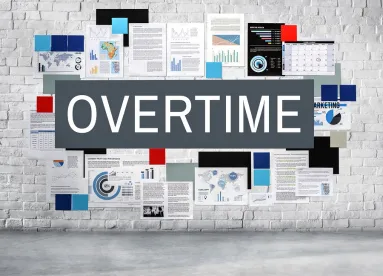The United States Department of Labor (DOL) issued revised regulations on May 18, 2020, effectively expanding the exemptions under Section 7(i) of the Fair Labor Standards Act (FLSA), which permits certain commissioned employees of “retail or service establishments” to be considered exempt from overtime. Designed to “reduce confusion,” the new rule, which takes effect immediately, removes from the existing regulations two lists: a partial list of industries that were presumed to have “no retail concept” and a non-exhaustive list of business that “may be recognized as retail.”1 By doing so, certain businesses previously on the non-retail list may now qualify for the Section 7(i) exemption if they otherwise meet the DOL’s criteria for the exemption. In other words, all businesses, regardless of their industry, will be treated consistently. This change therefore may increase the number of employers that qualify as “retail” businesses falling under the Section 7(i) exemption.
By way of background, these lists date back to 1961. The first list included a total of 134 non-exhaustive categories of establishments that the DOL determined had no “retail concept,” like dry cleaners, roofing companies, and travel agencies. The “may be” list included 77 categories of businesses, like home refrigerator repair businesses and taxidermists, that were presumed to qualify for the 7(i) exemption. Over the years, the courts have viewed these lists as “incomplete, arbitrary, and essentially [a] mindless catalog.”2 Also, the unwavering nature of the lists did not take into consideration changes and disruptions in various industries, as well as evolving customer habits and economic realities.
Under the new revised rule, businesses previously covered by these two lists may be able to avail themselves of the exemption and should review their practices relating to commissioned employees under the general DOL guidelines on Section 7(i). Specifically, these businesses may now avail themselves of the exemption for commissioned employees if they show that:
(1) They are a “retail or service” establishment as defined generally by the DOL.
(2) The employee’s regular rate of pay is at least one-and-a-half times greater than the minimum wage for each hour that the employee worked in a week in which he or she worked overtime;
(3) At least half of the employee’s earning during that time period must be from commissions.3
Unless all three conditions are met, the exemption does not apply, and the employer must pay overtime for all hours worked over a 40-hour workweek.
Going forward, previously listed employers should still exercise caution in availing themselves of the Section 7(i) exemption, as they may potentially face litigation over whether their business is a retail or service establishment. Notably, the burden is on employers to establish the Section 7(i) factors. Also, parallel state laws must also be taken into consideration where applicable. Ultimately, however, the new rule may streamline and clarify the Section 7(i) exemption inquiry in a way that will benefit employers.
1Previously found at 29 CFR §§ 779.317 and 779.320
2See, e.g., Alvarado v. Corporate Cleaning Services, Inc., 782 F.3d 365, 371 (7th Cir. 2015)
3See Fact Sheet #20: Employees Paid Commissions By Retail Establishments Who Are Exempt Under Section 7(i) From Overtime Under The FLSA, https://www.dol.gov/agencies/whd/fact-sheets/20-flsa-commissions-retail.




 />i
/>i

